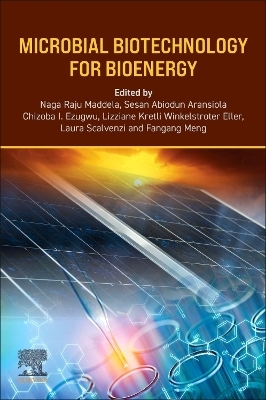
Microbial Biotechnology for Bioenergy
Elsevier - Health Sciences Division (Verlag)
978-0-443-14112-6 (ISBN)
Naga Raju Maddela received his M.Sc. (1996–1998) and Ph.D. (2012) in Microbiology from Sri Krishnadevaraya University, Anantapuramu, India. During his doctoral program in the area of Environmental Microbiology, he investigated the effects of industrial effluents/insecticides on soil microorganisms and their biological activities, and he is working as Faculty in Microbiology since 1998, teaching undergraduate and postgraduate students. He worked on Prometeo Investigator (fellowship received from SENESCYT) at Universidad Estatal Amazónica, Ecuador during 2013-15, received "Postdoctoral Fellowship" (2016–2018) from Sun Yat-sen University, China. Currently, he is working as a Full Professor at the Facultad de Ciencias de la Salud, Universidad Técnica de Manabí, Portoviejo, Ecuador. He has been actively publishing scientific articles, books (authored and edited) and chapters since 2007. Sesan Abiodun Aransiola, Asst. Chief Scientist, M.Tech., (Ph.D.,), Bioresources Development Centre, National Biotechnology Development Agency (NABDA), Ogbomoso, Nigeria. He has published over 50 referred articles in professional Journals including many book chapters. Also, he is an Assistant Chief scientific officer with National Biotechnology Development Agency, Nigeria. His area of interest is Environmental Microbiology with research area in Phytoremediation, Biosorption and Bioremediation. His expertise includes soil, environment, heavy metals, environmental impact assessment, environmental pollution, wastewater treatment, water and wastewater treatment, microbiology, biotechnology, ecology. Ezugwu Chizoba Ignatius received his PhD in Material Physics and Chemistry in 2016 at Wuhan University of Technology, China. At the State Key Laboratory of Advanced Technology for Material Synthesis and Processing, his research interest was focused on design, preparation and modifications of metal-organic frameworks for catalytic organic transformation. While working with Prof. Verpoort, he developed new N-heterocyclic carbene based MOF catalysts that are very efficient for coupling and condensation reactions. His PhD research was fully sponsored by Chinese Government Scholarships, and he was awarded the «2016 Outstanding International Graduating Student Award» of Wuhan University of Technology. Presently, he is developing advanced hybrid catalytic materials for CO2 reduction as a GET-COFUND MarieCurie Fellow at the University of Alcala and IMDEA Water Institute. She holds a degree in Biochemical Pharmacy from the Federal University of Alfenas (2006), a Master's in Pharmacy from the Faculty of Pharmaceutical Sciences of the USP of Ribeirão Preto (2009) and a PhD in Pharmacy from the Faculty of Pharmaceutical Sciences of Ribeirão Preto (2012). She held a sandwich doctorate at the Food and Drug Administration (USA) for one year (2011). Completed postdoctoral studies at the Faculty of Pharmaceutical Sciences at USP in Ribeirão Preto (2014). She is currently a professor at the Universidade do Oeste Paulista -Unoeste, working in the courses of the Faculty of Health Sciences (biomedicine, pharmacy, nutrition and dentistry) and in the Masters in Health Sciences. Has experience in Pharmacy, working mainly on the following subjects: lactic acid bacteria, food and clinical pathogens, probiotics, molecular biology, biofilms, cell culture, nutraceuticals, and nanoparticles. Laura Scalvenzi has a Doctoral Degree in Biotechnology and a bachelor’s degree in Agricultural Sciences. She worked in international development project focused on sustainable use of biodiversity in the Amazonian rainforest (Ecuador), according to the Sustainable Development Goals (SDGs). acted as scientist and facilitator between universities, government, and non-governmental organizations. I possess emotional intelligence and I am very empathic with people. I have strong analytical, problem solving, time management, scientific and teamwork skills. Fangang Meng is an academic researcher from Sun Yat-sen University. The author has contributed to research in topic(s): Membrane fouling & Membrane bioreactor. The author has an h-index of 39, co-authored 135 publication(s) receiving 7429 citation(s). Previous affiliations of Fangang Meng include Guangzhou Higher Education Mega Center & Hong Kong University of Science and Technology.
Section 1: Sources, Challenges and Environmental views 1. Microbial biotechnology for bioenergy- An introduction 2. Global advances in bioenergy production technologies 3. Role of biotechnology and bioprocess in bioenergy 4. Distributions of biomass sources for bioenergy production: Challenges and Benefits 5. Decarbonization and the future fuels 6. Bioenergy: The environmentalist perspectives 7. Emerging innovations of bioenergy in some developing countries 8. Current trend of bioenergy of biogas, biomethane and hydrogen in developed country 9. Emerging technology in global bioenergy generation Section 2: Yesterday, Today and Tomorrow Innovations of bioenergy 10. Bioconversion of biomass energy and biological residues: the role of microbes 11. Potentials of organic waste to provide Bioenergy 12. Biotechnology of biofuels: bioethanol and biodiesel 13. The sustainability of cellulosic ethanol energy and artificial photosynthesis 14. Power-to-X and integrating energy storage innovations 15. Sustainability of Microbial fuel cells, marine energy and Hydrogen 16. Bioenergy as a global public tools and technology transfer 17. The past, present and future of biotechnology in bioenergy Section 3: Matters Arising in Bioenergy Advancement 18. The politics and policies of Bioenergy advancement: Global Perspectives 19. Biotechnology for renewable fuels and chemicals 20. Environmental degradation: technology and contributions to Bioenergy 21. The way forward in Bioenergy technology for developing countries 22. Bioenergy replacing fossil fuels and its role in global warming mitigation 23. Economic perspective of bioenergy generation 24. The future research of bioenergy technology
| Erscheinungsdatum | 05.03.2024 |
|---|---|
| Verlagsort | Philadelphia |
| Sprache | englisch |
| Maße | 191 x 235 mm |
| Gewicht | 450 g |
| Themenwelt | Technik ► Elektrotechnik / Energietechnik |
| Technik ► Umwelttechnik / Biotechnologie | |
| ISBN-10 | 0-443-14112-6 / 0443141126 |
| ISBN-13 | 978-0-443-14112-6 / 9780443141126 |
| Zustand | Neuware |
| Haben Sie eine Frage zum Produkt? |
aus dem Bereich


